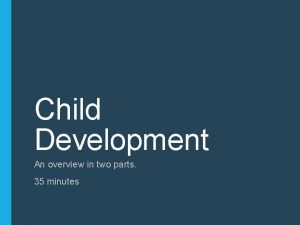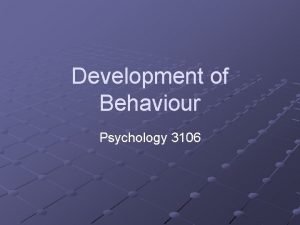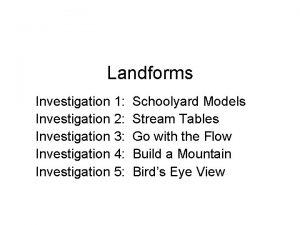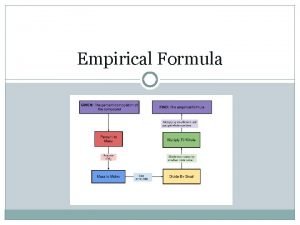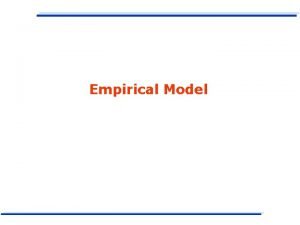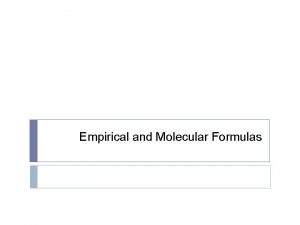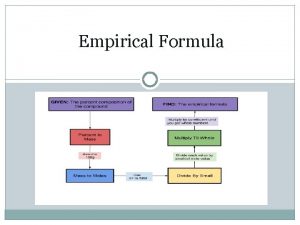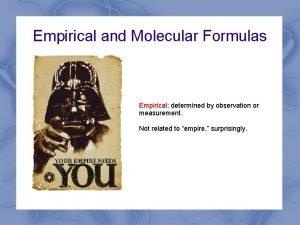An empirical investigation of the lived experience of














![Reference Corsten, H. , and Gössinger, R. (2007). Dienstleistungsmanagement [Service Management]. München, Deutschland: Oldenbourg. Reference Corsten, H. , and Gössinger, R. (2007). Dienstleistungsmanagement [Service Management]. München, Deutschland: Oldenbourg.](https://slidetodoc.com/presentation_image_h/289b39f7cac2648df1883fab8be4ffc7/image-15.jpg)


- Slides: 17

An empirical investigation of the lived experience of service productivity of bank executives working as ‘official knowledge workers’ in the Nigerian banking sector. Dr Obafemi Onyedikachi Olekanma Teesside University Business School Middlesbrough England United Kingdom Paper presented at BAM 2020, ‘Conference in the Cloud’; Sept 2 - 4, 2020

Presentation outline I. About the authors of the paper II. Introduction / study problem statement III. Research rationale / research aim / objectives IV. Literature Review V. Outcome of literature synthesis VI. Research framework and data analysis VII. Results VIII. Discussion IX. Conclusion X. Reference XI. Definition of key terms African Divination mat Lived experience of service productivity of bank executives BAM 2020

About the authors Author of the BAM Paper Dr Obafemi O. Olekanma; Ph. D, MSc, B. Sc. ; FCIB, MBA. Obafemi is a lecturer in Business and Management studies at Teesside University Business School with over a decade of industry experience at senior management level before joining academia. He gained his Ph. D from the prestigious University of Strathclyde Business School, Glasgow Scotland UK in the field of Management Science. Co-Author of the BAM Paper Dr Zahoor A. Soomro; Ph. D, M. A, M. P. A. Zahoor is a lecturer in Business Management at Teesside University. He has earned his doctorate degree from University of Central Lancashire, Preston UK in the field of online Business Management. His research focus is on human and organisational knowledge management and service operations. In this work, he explored the lived experience of service productivity of Nigerian bank executives employed as official knowledge workers’ as a way to provide insights to all stakeholders. He has written several working and conference papers in the area of individual and institutional productivity improvements. His research is mainly focused on identity fraud management in e-tail organisations. Through empirical research, Zahoor has explored various types of online frauds faced by large online organisations. His research has focused on effective management of identity fraud to develop beneficial customer relationship and control fraud loses. His publications include co-authoring of two books titled ‘Building a balanced scorecard to improve organisational performance: the essential toolkit for executives’ and ‘The performance-driven organisation: how to create the strategic leadership and performancedriven organisation, which is available for sale on amazon. com. His publications include holistic view of managing information security, identity fraud management, m-commerce fraud prevention. Currently he is working on development of a contextual framework for identity fraud management, extending deterrence theory in identity fraud prevention context and significance of policy management in prevention of online frauds. His current works include Knowledge worker productivity in the banking sector(under journal review), and Trans Position Cognition Approach: A synthesised based phenomenological method for practitioners and academia (under journal review). Lived experience of service productivity of bank executives BAM 2020

Introduction Research setting: Lagos; Nigeria is one of 52 countries in Africa, the largest economy with estimated population of over 200 million. Research Focus: Bank executives lived experience of service productivity in the Nigerian banking sector. Critical Banking Regulatory Policy: In 2011, the apex bank regulatory body Central bank of Nigeria introduced a knowledge based ‘fit and proper person policy’ that discriminated against bank executives employed in the sector. • Nigeria came into being in 1892 • Policy Implication: Bank executives that meets the ‘fit and proper person’ criteria were authorised to carry out ‘control functions’ that significantly impact the service operations of the banks. Bank executives that met this ‘knowledge based criteria were termed ‘official knowledge workers’ in this work as they are a subset of the ‘knowledge workers’ conceptualised by Peter Drucker in 1959. Historically, the banking institutions in However, formal banking legislation was only introduced in the year 1952, recognising 5 banks and 40 branches • As at 2019, Nigeria had 22 banks (CBN, 2019) providing financial services to the general public and businesses, ensuring economic and social stability and sustainable growth of the economy. Lived experience of service productivity of bank executives BAM 2020

Problem statement The Nigerian banking public were of the notion that the unsatisfactory level of service obtainable in the Nigerian banking sector, stems from the suboptimal productivity of the bank executives employed in the sector, as official knowledge workers. Lived experience of service productivity of bank executives BAM 2020

Research rationale • Banking sector is the ‘main anchor and backbone of the Nigerian economy‘ and ‘official knowledge workers’ play significant role in the sector. • The actions and inactions of this unique group of bank executives has implications for both the service offered customers and service productivity of the Nigerian banks. • Hence, exploring these bank executives lived experience of service productivity should provide insights that can help us know their true contribution in the Nigerian banking sector as well as to contribute to the service productivity body of knowledge. Earliest form of currency in West Lived experience of service productivity of bank executives BAM 2020

Research aim, question and objectives Research aim Research question • • The research aim of the study is to understand the lived experience of service productivity of bank executives working as ‘official knowledge workers’ in the Nigerian banking sector. What is the lived experience of service productivity of bank executives working as ‘official knowledge workers’ in the Nigerian banking sector. Research objectives • Identify who can become an official knowledge worker in the Nigerian banking sector. • Explore the lived experience of service productivity of bank executives termed in this work as official knowledge workers employed in the Nigerian banking sector. Lived experience of service productivity of bank executives BAM 2020

The Knowledge Worker and Service Productivity within the banking operations context Literature review • Drucker (1959) was the first to coined the concept of ‘knowledge worker’ and perform work that involved the use of vision; knowledge and concepts; work that is based on the mind rather than the hand majorly knowledge work. • Nigerian bank executives as subset of ‘knowledge workers’(Drucker, 1959) carry out control functions (knowledge work), hence are critical enablers of service productivity of their banks. Service • • • Service could be a change in the condition of a person or goods carried out by the service provider with the agreement of the consumer of the service (Hill, 1999). Service from the customer’s perspective can be construed as an ‘experience (Johnston et al. , 2011). Service as an application of specialised ‘competences’ (knowledge and skill (Vargo and Lusch, 2004, 2016). There is a dearth of literature from the research setting in respect of the study area. Hence, transdisciplinary subject areas such as • service productivity and • knowledge worker within the context of banking operations service productivity were explored. Lived experience of service productivity of bank executives BAM 2020

Outcome of literature synthesis Synthesis of the transdisciplinary literature found and reviewed suggest that • • Most studies as outlined in our BAM 2020 conference paper table 1 on pages 7&8 were very insightful but can be termed organisational perspective orientated works. This enabled us to identify a unique knowledge gap in service productivity literature – ‘Individual perspective orientation’ in lieu of ‘organisational perspective Actions of official knowledge orientation’, a gap which this study workers as enablers of service hopes to fill. productivity performing control Using the idea of the official knowledge worker as the key enabler of service productivity in the banking sector, this allows us to adopt the ‘individual perspective orientation’ approach in this study functions in the banks connotes subjective phenomena Lived experience of service productivity of bank executives BAM 2020

Research framework Philosophical Framing Interpretivism (as it supports the subjective nature of our study phenomena in lieu of positivist paradigm that supports objective phenomena) Research Approach Qualitative, abductive study (as it enable exploration of the subjective phenomena from where inference can be drawn in lieu of quantitative approach that test theories) Research strategy Phenomenological research method (study explores lived experience of participants which is a subjective phenomena) Methodology Lived experience of service productivity of bank executives BAM 2020

Data collection and data analysis Data analysis Selection of participants • • Purposive sampling technique The targeted participants were the hard to reach top bank executives (Assistant General Manager to Managing Director Grade) in the Nigerian banks. • Interview data collected was transcribed verbatim into text • Study text generated for analysis required the use of principles from the two major phenomenological schools of thoughts • Due to polemical arguments, researchers in the domain are wedged to either the descriptive or interpretive phenomenological research approaches. • Trans Position Cognition Phenomenological Approach (Olekanma, 2018) a new phenomenological approach that synthesises principles from both the descriptive and interpretative phenomenological schools of thoughts was initiated and used to analyse the study text. Data collection • • • Face to face qualitative semi-structured interviews 16 bank executives from the five top banks in Nigeria participated Field work collecting data lasted about six months Methodology Lived experience of service productivity of bank executives BAM 2020

Results The five Ri-PTs themes were interpreted at a higher level of abstraction to allow for the emergence of ‘service capacity deficit’ as theme which typifies the lived experience of service productivity of the study participants working in the Nigerian banking sector Analysis of the study text led to the emergence of 21 participants themes emerged (see table 3, page 13 of this BAM conference paper) Knowledge gap identified The interpretation of these 21 participants themes led to the emergence of five second level themes which we named ‘Researcher’s Interpretations’ themes (Ri-PT), they include 1. Highly regulated workplace, 2. Unfriendly operational environment, 3. Counterproductive operational strategy, 4. Knowledge gap, and 5. Subjective deposit mobilisation quantitative assessment criteria. Lived experience of service productivity of bank executives BAM 2020

Insights from execs Discussion Highly regulated workplace § Extant banking sector regulatory policies eroded their capacity for genuine creativity § These regulations limit what the study bank executives can and cannot do. Unfriendly operational environment § Endemic culture of master-servant dominant management approach (the Nigerian way of working) § Infantilisation of the knowledge quotient of bank executives resulting in dearth of innovative application of knowledge. Counterproductive operational strategy’ § Nigerian bank executives ‘are rule takers’ as they have to contend with the ‘African cultural value system’ § Inefficiencies such as ‘seller’s market characteristics of the Nigerian banking sector’ helps to promote the practice. Knowledge gap’ § Erosion of ‘professional’ knowledge due to the high attrition rate of experienced bankers. § Dearth of a personal learning culture. “Quality of personnel is the most important, but they are scarce in the Nigerian banking sector” Subjective deposit mobilisation quantitative assessment criteria’ § Executives not evaluated based on knowledge quotient but on the ability to mobilise deposit for their banks. § Deposit target attainment constitute key element in productivity measure with implication for their continuous employment. These issues impairs the service capacity of the bank executives employed as ‘official knowledge workers in the Nigerian banks with implications for their lived experience of service productivity in their banks. Lived experience of service productivity of bank executives BAM 2020

Conclusion • This study adopted the phenomenological research approach. • It identified the service capacity deficit related factors that negatively impact the Nigerian bank executives lived experience of service productivity which their managers does not consider as such but which has implications for their productivity measures. • This study output highlighted service capacity deficit related factors which impacts the Nigerian bank executives lived experience of service productivity which the Nigerian banking public are not aware of. • This work output provides bank management and policymakers with the phenomenological lens through which they can view, understand manage better these official knowledge workers which may have implications for their lived experience of service productivity. Lived experience of service productivity of bank executives BAM 2020
![Reference Corsten H and Gössinger R 2007 Dienstleistungsmanagement Service Management München Deutschland Oldenbourg Reference Corsten, H. , and Gössinger, R. (2007). Dienstleistungsmanagement [Service Management]. München, Deutschland: Oldenbourg.](https://slidetodoc.com/presentation_image_h/289b39f7cac2648df1883fab8be4ffc7/image-15.jpg)
Reference Corsten, H. , and Gössinger, R. (2007). Dienstleistungsmanagement [Service Management]. München, Deutschland: Oldenbourg. Drucker, P. F. (1959). The Landmarks of Tomorrow. First Edition; New York; Harper & Row Publishers. Djellal, F. , and Gallouj, F. (2013). Challenges of measuring service productivity in innovative, knowledge-intensive business services. The Service Industries Journal, 33 (3 & 4), pp. 378– 391 Gronroos, C. , and Ojasalo, K. , (2004). Service productivity. Towards a conceptualisation of the transformation of inputs into economic results in services. Journal of Business Research, Vol. 57(4) Lasshof, B. , (2006). Produktivität von Dienstleistungen: Mitwirkung und Einfluss des Kunden. Deutscher Universitätsverlag. 1. Jääskeläinen, A. (2009). Identifying a Suitable Approach for Measuring and Managing Public Service Productivity. Journal of Knowledge Management, Vol. 7(4), pp 447 – 458. Parasuraman, A. (2010). Service productivity, quality and innovation: Implications for service-design practice and research. International Journal of Quality and Service Sciences, Vol. 2(3), pp. 277 -286. Vargo, S. L. , and Lusch, R. F. (2016). Institutions and axioms: an extension and update of service-dominant logic. Journal of the Academy of Marketing Science, Vol. 44(4), pp 5 -23. Vuorinen, I. , Järvinen, R. , and Lehtinen, U. (1998). Content and Measurement of Productivity in the Service Sector: A conceptual analysis with an illustrative case from the insurance business. International Journal of Service Industry Management. Vol. 9(4), pp. 377 -396. Yalley A A and Sekhon, S. H. (2014). Service production process: implications for service. International Journal of Productivity and Performance Management, [e-journal] Vol. 63(8), 2014 pp. 1012 -1030. 1108/IJPPM-10 -2012 -0113 Lived experience of service productivity of bank executives BAM 2020

Definition of key terms This section outlines the definitions/meaning of the key terms used in this study. They include 1. Control functions: This term refers to those critical operational and strategic responsibilities that impact the solvency of the banks with implication for the entire banking sector. 2. Knowledge worker: Knowledge worker a term first coined by Peter Drucker in 1959, refers to employees that would be routinely expected to innovate, often coming up with new and better ways of doing things, and whose job requires them to think for a living (Davenport, 2005). 3. Lived experience: This term refers to ‘a phenomenological picture’ of the experiences that these study participants lived through, which means to fully give a first-hand account of living as a member of the atypical group in a research setting. 4. Official knowledge worker: This term refers to bank executives working in the Nigerian banking sector that meet the ‘fit and proper person’ criteria as stipulated by the apex regulatory bank, Central Bank of Nigeria. This definition within the context of this work constitutes what makes a bank executive a “knowledge worker” in the Nigerian banking sector. Lived experience of service productivity of bank executives BAM 2020

Thank you Questions and or feedbacks are welcome ! For further information about this work, please contact Dr Obafemi. O. Olekanma o. olekanma@tees. ac. uk obafemi@obafemiolekanma. com Teesside University Business School Middlesbrough, England United Kingdom. Lived experience of service productivity of bank executives BAM 2020
 Chapter 8: race and ethnicity as lived experience
Chapter 8: race and ethnicity as lived experience Continuity vs discontinuity
Continuity vs discontinuity Indirect experience examples
Indirect experience examples Imprinting meaning psychology
Imprinting meaning psychology Thế nào là hệ số cao nhất
Thế nào là hệ số cao nhất Diễn thế sinh thái là
Diễn thế sinh thái là Vẽ hình chiếu vuông góc của vật thể sau
Vẽ hình chiếu vuông góc của vật thể sau Lp html
Lp html Phép trừ bù
Phép trừ bù Lời thề hippocrates
Lời thề hippocrates Thang điểm glasgow
Thang điểm glasgow đại từ thay thế
đại từ thay thế Vẽ hình chiếu đứng bằng cạnh của vật thể
Vẽ hình chiếu đứng bằng cạnh của vật thể Quá trình desamine hóa có thể tạo ra
Quá trình desamine hóa có thể tạo ra Thế nào là mạng điện lắp đặt kiểu nổi
Thế nào là mạng điện lắp đặt kiểu nổi Khi nào hổ mẹ dạy hổ con săn mồi
Khi nào hổ mẹ dạy hổ con săn mồi Các châu lục và đại dương trên thế giới
Các châu lục và đại dương trên thế giới Các loại đột biến cấu trúc nhiễm sắc thể
Các loại đột biến cấu trúc nhiễm sắc thể

